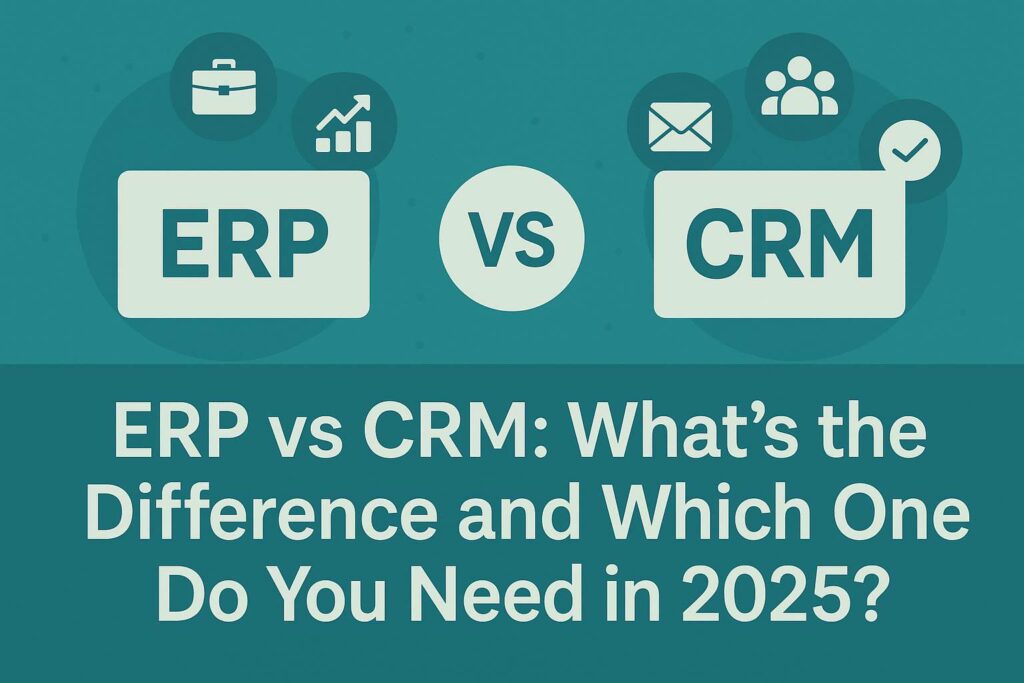ERP vs CRM: What’s the Difference and Which One Do You Need in 2025?
If you’re trying to choose between ERP vs CRM software for your business in 2025, you’re not alone. These systems often overlap in function, yet they serve different core purposes.
In this guide, you’ll learn the key differences, benefits, and how to decide which system (or both) is right for your business growth strategy.
What Is ERP and CRM?
ERP (Enterprise Resource Planning) manages back-end business operations such as inventory, finance, HR, and supply chain. It focuses on internal processes.
CRM (Customer Relationship Management) helps manage front-end customer interactions like sales, marketing, and support. It focuses on external relationships.
ERP and CRM Systems: A Side-by-Side Comparison
| Feature | ERP | CRM |
| Primary Focus | Operations, resources, accounting | Sales, customer service, marketing |
| Key Users | Finance, operations, supply chain | Sales reps, marketing, support |
| Main Benefit | Process efficiency and cost control | Lead tracking and customer loyalty |
| Common Modules | Inventory, payroll, procurement | Sales pipeline, email automation |
| Data Flow Direction | Internal business data | External customer data |
ERP and CRM Difference Explained Simply
Here’s an easy way to remember it:
- ERP helps you run the business efficiently
- CRM helps you grow the business effectively
Both systems handle data and workflows, but from opposite ends of the business spectrum.
ERP vs CRM: Which Is Better for Your Business?
The real question isn’t which is better, but which solves your current pain points.
Choose ERP if you:
- Struggle with inventory management
- Need to consolidate financials
- Want to automate internal workflows
Choose CRM if you:
- Need better sales tracking
- Want stronger customer engagement
- Lack visibility into your pipeline
Choose both if you:
- Want complete operational + customer alignment
- Need unified data across all teams
- Are scaling fast and need full control
ERP and CRM Systems in 2025: What’s New?
In 2025, the lines between ERP and CRM are becoming more blurred, especially with platforms like the Odoo ERP system, which offer both sets of tools in a single interface.
Key 2025 trends:
- AI-powered analytics for sales and operations
- Cloud-native systems with mobile-first designs
- Tighter integration between CRM and ERP modules
FAQs
What is the difference between ERP and CRM?
ERP focuses on internal processes like finance and inventory. CRM manages external customer relationships like sales and service.
Can a business use both ERP and CRM?
Yes. Many businesses integrate both systems to streamline operations and improve customer experience.
Which is better: ERP or CRM?
It depends on your needs. ERP is better for operations; CRM is better for customer engagement. Many modern tools offer both.
How ERP and CRM Work Together
Integrating ERP and CRM can create a seamless workflow across departments. For example:
- A sales rep closes a deal in CRM →
- Order details are sent to ERP for fulfillment and invoicing →
- Inventory is updated in real-time →
- Finance gets auto-generated reports
This flow boosts accuracy, reduces delays, and improves customer satisfaction.
Real Example: Combining ERP & CRM with Odoo
A retail business used separate CRM and ERP systems, leading to data silos and delays. After switching to Odoo ERP system, they achieved:
- 28% faster order processing
- Real-time customer data across all departments
- Integrated sales and warehouse management
This proves the value of unified solutions and strong ERP implementation services.
Choosing the Right System
Here are a few questions to help guide your choice:
- Do you need to automate operations or grow sales first?
- Are your departments working in silos?
- Do you want one platform or prefer integrating two?
If you’re still unsure, a professional ERP software consultation can help assess your goals and recommend the right solution.
Final Thoughts: ERP vs CRM in 2025
Understanding the ERP and CRM difference is essential in 2025. Both tools have distinct purposes, but they work even better when used together.
If your business is evolving, now is the time to explore custom ERP solutions or hybrid platforms that bring the best of both worlds. And don’t forget to invest in ERP system training to make the most of your tools.

